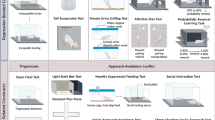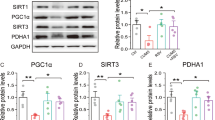Post-weaning social isolation of male Wistar rats for 10 weeks led to an increase of their aggressiveness, sensorimotor reactivity, and cognitive deficiency, manifesting in training disorders evaluated by the acoustic startle response (amplitude of the response decreasing). Expression of gene encoding serine protease prolyl endopeptidase (EC 3.4.21.26) in the frontal cortex was higher than in control rats kept in groups, while the level of mRNA of the gene encoding dipeptidyl peptidase IV (EC 3.4.14.5) did not differ from the control in any of the brain structures. The levels of serotonin transporter gene mRNA in the striatum and hypothalamus were higher than in the control. No appreciable changes in the expression of genes encoding tryptophan hydroxylase-2 and monoaminoxidase A and B in the frontal cortex, striatum, amygdala, hypothalamus, and hippocampus were detected. The data indicated the involvement of genes associated with the serotoninergic system in the mechanisms of mental disorders induced by post-weaning social isolation and suggest the gene encoding prolyl endopeptidase as a candidate gene involved in the pathogenesis of these disorders.
Similar content being viewed by others
References
Krupina NA, Khlebnikova NN, Orlova IN. Early social isolation increases aggression and impairs a short-term habituation in acoustic startle reflex in rats. Patol. Fiziol. Eksp. Ter. 2015;59(4):4-15. Russian.
Kudryavtseva NN, Smagin DA, Kovalenko IL, Galyamina AG, Vishnivetskaya GB, Babenko VN, Orlov YL. Serotonergic genes in the development of anxiety/depression-like state and pathology of aggressive behavior in male mice: RNA-seq data. Mol. Biol. 2017;51(2):251-262.
Khlebnikova NN, Medvedeva YS, Krupina NA. Early Social Isolation Causing Emotional Motivational Alterations in Rats, is Accompanied by a Deficit of Short-term Habituation, but does not Affect Spatial Memory. Zh. Vyssh. Nervn. Deyat. 2018;68(5):647-663. Russian.
Amstislavskaya TG, Kudryavtseva NN. Effect of repeated experience of victory and defeat in daily agonistic confrontations on brain tryptophan hydroxylase activity. FEBS Lett. 1997;406(1-2):106-108.
Babkova K, Korabecny J, Soukup O, Nepovimova E, Jun D, Kuca K. Prolyl oligopeptidase and its role in the organism: attention to the most promising and clinically relevant inhibitors. Future Med. Chem. 2017;9(10):1015-1038.
Fone KC, Porkess MV. Behavioural and neurochemical effects of post-weaning social isolation in rodents-relevance to developmental neuropsychiatric disorders. Neurosci. Biobehav. Rev. 2008;32(6):1087-1102.
Gapp K, von Ziegler L, Tweedie-Cullen RY, Mansuy IM. Early life epigenetic programming and transmission of stressinduced traits in mammals. Bioessays. 2014;36(5):491-502.
Gardner KL, Hale MW, Lightman SL, Plotsky PM, Lowry CA. Adverse early life experience and social stress during adulthood interact to increase serotonin transporter mRNA expression. Brain Res. 2009;1305:47-63.
Godar SC, Bortolato M, Frau R, Dousti M, Chen K, Shih JC. Maladaptive defensive behaviours in monoamine oxidase A-deficient mice. Int. J. Neuropsychopharmacol. 2011;14(9):1195-1207.
Krupina NA, Zubkov EA, Orshanskaya EV, Zorkina YA, Khlebnikova NN. Gene expression in the brain of adult rats with behavioural alterations caused by neonatal exposure to the dipeptidyl peptidase-IV inhibitors diprotin A and sitagliptin. Eur. Neuropsychopharmacol. 2016;26(Suppl. 2):S173. doi: https://doi.org/10.1016/S0924-977X(16)31000-8.
Livak KJ, Schmittgen TD. Analysis of relative gene expression data using real time quantitative PCR and the 2(-Delta Delta C(T)) method. Methods. 2001;25(4):402-408.
Lukkes JL, Kopelman JM, Donner NC, Hale MW, Lowry CA. Development*environment interactions control tph2 mRNA expression. Neuroscience. 2013;237:139-150.
Márquez C, Poirier GL, Cordero MI, Larsen MH, Groner A, Marquis J, Magistretti PJ, Trono D, Sandi C. Peripuberty stress leads to abnormal aggression, altered amygdala and orbitofrontal reactivity and increased prefrontal MAOA gene expression. Transl. Psychiatry. 2013;3:e216. doi: https://doi.org/10.1038/tp.2012.144.
Meyer N, Richter SH, Schreiber RS, Kloke V, Kaiser S, Lesch KP, Sachser N. The unexpected effects of beneficial and adverse social experiences during adolescence on anxiety and aggression and their modulation by genotype. Front. Behav. Neurosci. 2016;10):97. doi: https://doi.org/10.3389/fnbeh.2016.00097.
Shih JC, Chen K, Ridd MJ. Monoamine oxidase: from genes to behavior. Annu. Rev. Neurosci. 1999;22:197-217.
Author information
Authors and Affiliations
Corresponding author
Additional information
Translated from Byulleten’ Eksperimental’noi Biologii i Meditsiny, Vol. 166, No. 9, pp. 336-341, September, 2018
Rights and permissions
About this article
Cite this article
Zubkov, E.A., Zorkina, Y.A., Orshanskaya, E.V. et al. Post-Weaning Social Isolation Disturbs Gene Expression in Rat Brain Structures. Bull Exp Biol Med 166, 364–368 (2019). https://doi.org/10.1007/s10517-019-04351-0
Received:
Published:
Issue Date:
DOI: https://doi.org/10.1007/s10517-019-04351-0




